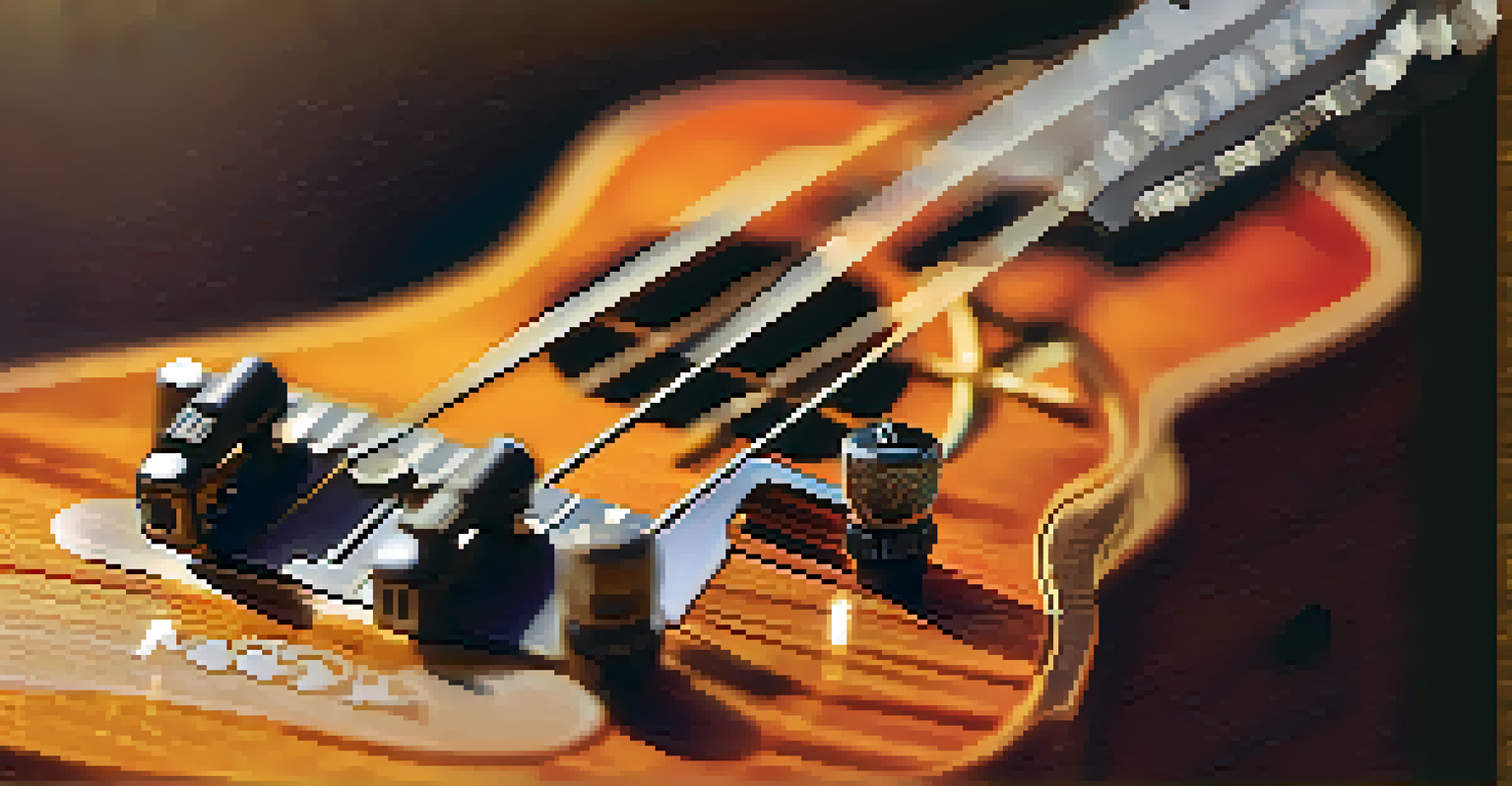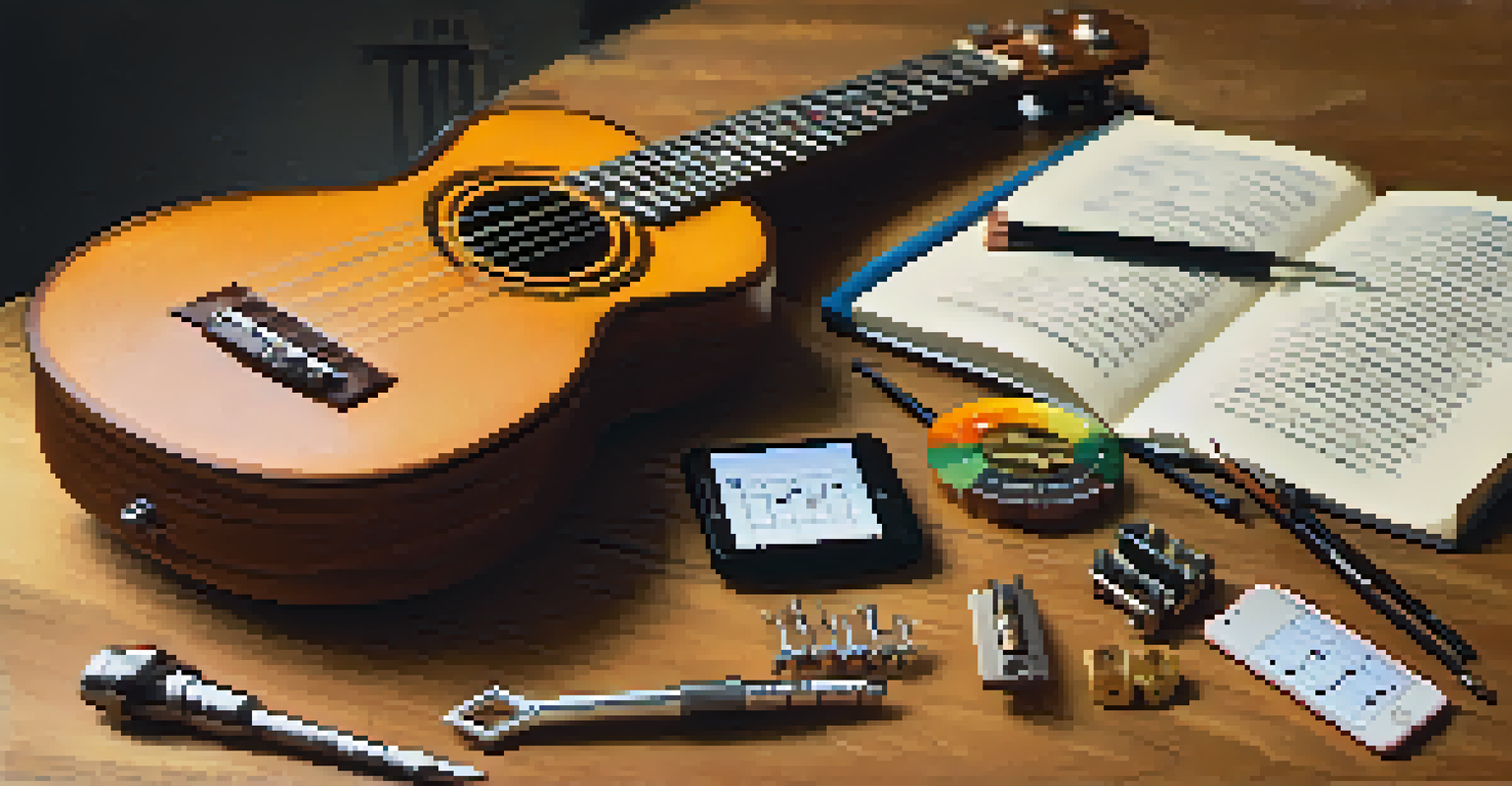Regular Tuning: A Crucial Habit for Ukulele Longevity

Why Tuning Matters for Your Ukulele's Sound Quality
Tuning your ukulele is absolutely vital for achieving that sweet, harmonious sound we all love. When your strings are in tune, they resonate beautifully, creating an enjoyable experience for both the player and the listener. Just imagine strumming a chord that sounds off-key; it's like trying to sing a duet with someone who's out of tune!
Music is the shorthand of emotion.
Moreover, consistent tuning helps maintain the integrity of the instrument. Strings that are out of tune can create unnecessary tension, which may lead to wear and tear over time. This not only affects the sound but can also damage the ukulele itself, leading to expensive repairs.
In essence, regular tuning is like giving your ukulele a daily check-up. Just as you wouldn’t skip your routine health appointments, your instrument deserves the same level of care to keep it sounding its best.
The Impact of Temperature and Humidity on Tuning
Did you know that temperature and humidity can significantly affect your ukulele's tuning? Wood, being a natural material, expands and contracts with changes in the environment. This means that if you play outdoors on a warm day and then bring your ukulele back inside where it's cooler, you might find it needs retuning.

For example, if you live in a humid area, the moisture can cause the wood to swell, impacting the tension of the strings. Conversely, dry conditions can lead to shrinkage. It's like trying to ride a bike with flat tires—no matter how hard you pedal, you won't go far until you fix those tires.
Tuning Enhances Sound Quality
Regular tuning ensures your ukulele produces harmonious sounds, enhancing the enjoyment for both player and listener.
To keep your ukulele sounding great, consider investing in a hygrometer to monitor your environment. By being aware of these conditions, you'll be better equipped to tune your instrument regularly, ensuring it stays in optimal shape.
Tuning Your Ukulele: Tools and Techniques
Tuning your ukulele can be a fun and easy process, especially with the right tools. Clip-on tuners, smartphone apps, and even tuning forks can help you achieve the perfect pitch. Clip-on tuners are particularly popular for their convenience; just attach it to the headstock and let it do the work.
The beautiful thing about learning is that no one can take it away from you.
A popular technique is to use the 'fifth fret method,' where you place your finger on the fifth fret of the G string and adjust the A string to match its pitch. This hands-on approach not only helps you learn the ukulele better but also engages your ear as you develop a sense of pitch.
Remember, practice makes perfect! The more you tune your ukulele, the more intuitive the process will become, turning a simple task into a rewarding ritual.
Signs Your Ukulele Needs Tuning
Sometimes it’s easy to overlook the signs that your ukulele needs tuning. If you notice that your chords sound discordant or notes seem to clash, it’s time to pick up that tuner. Just like how you might notice a friend is feeling off before they say anything, your ears can often detect when something isn’t quite right.
Another telltale sign is when your ukulele feels 'off' during play. If it requires extra effort to sound good, it may be a clear indicator that the strings need a little TLC. It's similar to wearing shoes that are too tight; they might look nice, but they won't feel good for long!
Environmental Factors Affect Tuning
Temperature and humidity can impact your ukulele's tuning, making it essential to monitor these conditions.
Being aware of these signs can save you from a frustrating playing session. Regularly checking your tuning not only enhances your playing experience but also prolongs the life of your instrument.
How Often Should You Tune Your Ukulele?
The frequency of tuning your ukulele can depend on a few factors, including how often you play and the conditions in which you store it. If you’re playing daily, a quick tune-up before each session is a good habit to develop. Think of it like warming up before exercise—it prepares you for a better performance.
For those who play less frequently, tuning every few sessions might suffice. However, a quick check before you play is always a smart move. It’s better to be safe than sorry, just like checking the weather before leaving the house.
Ultimately, listen to your instrument and trust your ears. Regular tuning ensures a consistently delightful playing experience and keeps your ukulele in top shape.
The Benefits of Developing a Tuning Routine
Establishing a tuning routine can transform your ukulele experience from mundane to magical. Not only does it ensure that your instrument always sounds its best, but it can also enhance your overall playing skills. Think of tuning as the pre-game warm-up; it sets the stage for a great performance.
A routine can also help you become more familiar with your instrument. As you tune regularly, you'll start to notice how your ukulele responds to different pitches and adjustments. This connection enhances your musical intuition, making you a better player overall.
Develop a Tuning Routine
Establishing a consistent tuning routine can improve your playing skills and strengthen your connection with your instrument.
Plus, a well-tuned ukulele can inspire creativity. When your instrument sounds good, you’re more likely to feel motivated to play and experiment with new songs or techniques.
Conclusion: A Little Tuning Goes a Long Way
In conclusion, regular tuning is not just a chore; it's a vital part of ukulele care that can significantly extend its life and enhance your playing experience. By taking a few minutes to tune before you play, you're investing in the quality of sound and longevity of your instrument. It’s a small effort that pays off in a big way!
So, whether you’re a seasoned musician or just starting out, make tuning a part of your routine. Embrace the process, and don’t be afraid to experiment with different tuning methods. This simple habit can open up a world of musical possibilities.

Remember, your ukulele is more than just an instrument; it's a companion on your musical journey. Treat it with care, and it will reward you with beautiful music for years to come.